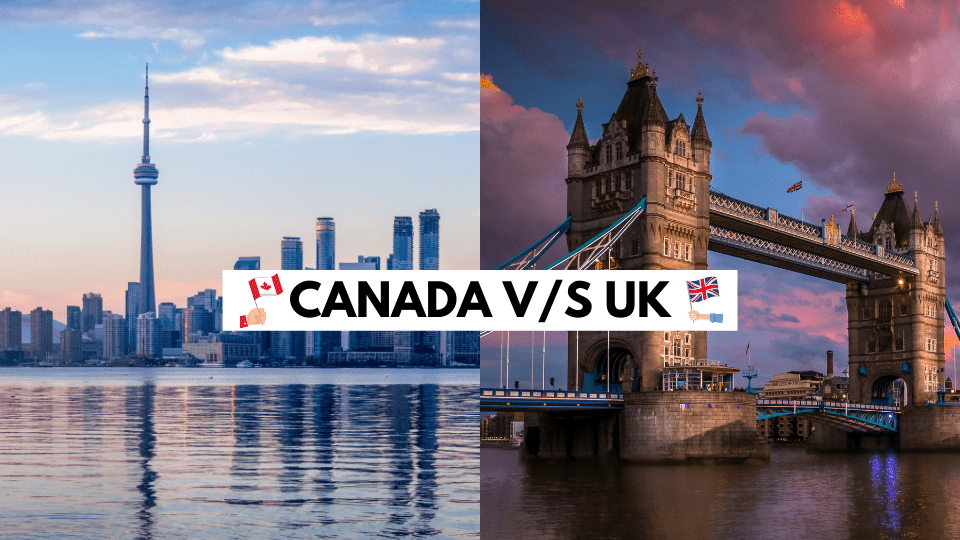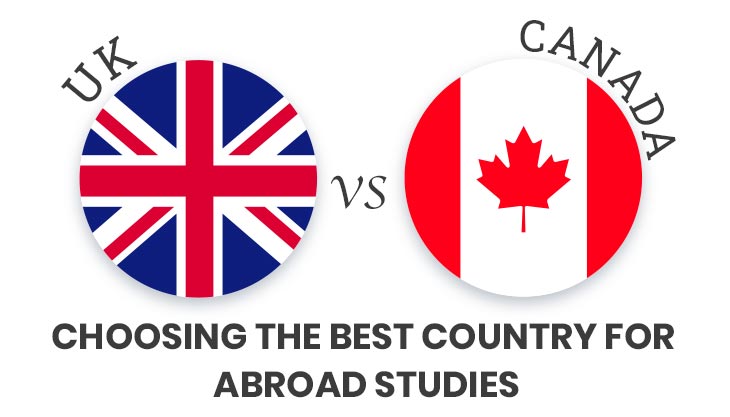


UK vs Canada: Which Country Offers Better Study Abroad Options?
When it comes to studying abroad, the United Kingdom (UK) and Canada are two popular destinations among international students. Both countries boast renowned educational institutions and offer a diverse range of programs. However, students often find themselves faced with the dilemma of choosing between the two. In this article, we will compare the study abroad options in the UK and Canada across various aspects to help you make an informed decision.
Overview of Education Systems
Both the UK and Canada have reputable education systems that prioritize academic excellence and offer a wide range of study options.
In the UK, the education system is highly regarded globally, with a rich history of prestigious universities such as Oxford and Cambridge. The UK follows a traditional approach to education, which includes a strong focus on theoretical knowledge, research, and critical thinking. The undergraduate degrees offered are typically three years in duration, while some programs such as Engineering and Medicine may take longer.
Canada, on the other hand, values a more practical and hands-on approach to education. Canadian universities are known for their emphasis on applied research and co-operative education programs, which provide students with valuable industry experience. Undergraduate degrees in Canada typically span four years, although some programs may be shorter or longer depending on the field of study.

Cost of Living and Tuition Fees
Considering the cost of living and tuition fees is an essential aspect for international students when choosing a study destination.
In terms of tuition fees, Canadian universities generally offer more affordable options compared to their UK counterparts. The average undergraduate tuition fees for international students in Canada range from CAD 20,000 to CAD 35,000 per year. In contrast, the average tuition fees in the UK can vary significantly, with international students paying around GBP 12,000 to GBP 35,000 per year.
When it comes to the cost of living, both countries have their advantages and challenges. While Canadian cities like Montreal and Vancouver can have a higher cost of living, cities in the UK, such as London, are known for their significantly higher expenses. It’s important to consider factors such as accommodation, transportation, and daily expenses when calculating the overall cost of studying abroad in either country.
Scholarship and Financial Aid Opportunities
Both the UK and Canada offer a range of scholarships and financial aid opportunities for international students.
study In the UK, there are various scholarships available to international students, such as the Chevening Scholarships, Commonwealth Scholarships, and numerous university-specific scholarships. These scholarships are awarded based on academic merit, leadership potential, and other criteria. Additionally, some universities offer financial aid programs to support students financially throughout their studies.
Similarly, Canada provides several scholarships and grants for international students, including the Vanier Canada Graduate Scholarships, Ontario Graduate Scholarships, and university-specific scholarships. Canadian universities also offer work-study programs, allowing students to gain valuable work experience while earning money to support their education.
It is crucial for students to thoroughly research and apply for scholarships and financial aid opportunities in both countries to ease the financial burden of studying abroad.
Quality of Universities and Programs
Both the UK and Canada have a strong reputation for their high-quality universities and programs, but they differ in terms of their specialties and areas of excellence.
The UK is home to some of the oldest and most prestigious universities globally and is particularly renowned for its humanities, social sciences, and business programs. Universities in the UK often have a long history of academic excellence, extensive research facilities, and a strong emphasis on critical thinking and independent study.
Canada, on the other hand, offers a wide range of programs across various fields, excelling particularly in STEM (Science, Technology, Engineering, and Mathematics) subjects. Canadian universities are recognized for their technological advancements, innovation, and research in fields such as engineering, computer science, and medicine.
When considering the quality of universities and programs, it is essential to research specific institutions and programs to ensure they align with your academic and career goals.
Opportunities for International Students
Both the UK and Canada provide ample opportunities for international students to thrive academically, professionally, and culturally.
In the UK, international students benefit from the multicultural environment of universities, which foster diversity and inclusivity. The country offers various work and internship opportunities, allowing students to gain practical experience and enhance their employability. Additionally, the UK student visa allows students to work part-time during their studies and stay back after graduation for up to two years through the Graduate Route.
study in Canada, known for its welcoming nature, ensures that international students feel at home during their study abroad experience. The country provides opportunities for students to engage in community activities, join student societies and clubs, and actively participate in the diverse cultural experiences. After completion of studies, Canada offers various pathways for international students to obtain Post-Graduation Work Permits (PGWPs) and potentially transition to permanent residency.
Conclusion
Both the UK and Canada offer excellent study abroad options for international students. While the UK excels in humanities and social sciences, and has a rich academic history, Canada’s practical approach to education and strengths in STEM fields make it an attractive destination. The decision ultimately depends on factors such as personal preferences, academic goals, financial considerations, and long-term career plans. It is advisable for students to thoroughly research and consider these factors before making the final decision. Whichever country students choose, studying abroad in the UK and Canada promises an enriching and transformative educational experience.
Remember, no matter where you choose to study abroad, it’s important to plan ahead, research thoroughly, and seek guidance from the appropriate educational institutions and advisors to make the most informed decision.
Get assistance to study abroad from our international education experts at Gateway International who can help guide you throughout your study abroad journey & avail our wide range of services for students on destinations like study in UK, study in USA, study in Canada, study in Ireland, study in Australia , study in the Netherlands and many other countries.
FAQs
Q1. Which country is more affordable for international students, the UK and Canada?
Both countries have their advantages, but Canada generally offers more affordable tuition fees and living costs for international students.
Q2. Can I work while studying in these countries?
Yes, both countries allow international students to work part-time while studying. Canada, however, offers more flexible work options.
Q3. What are the immigration options after graduation from these countries?
Canada’s PGWP program and the UK’s Graduate Route offer opportunities to work after graduation, with Canada having slightly more favorable policies.
Q4. Do these countries offer scholarships for international students?
Yes, both countries provide scholarships and financial aid for international students, but the availability and criteria vary.
Q5. Which country has a better climate, the UK and Canada?
The UK generally has a milder climate, while Canada can experience more extreme weather conditions in certain regions











